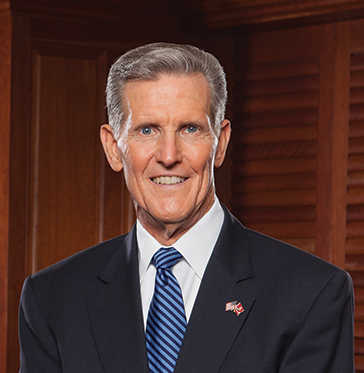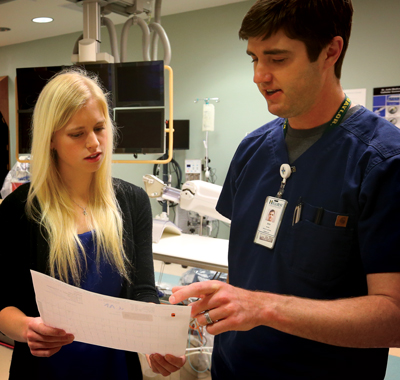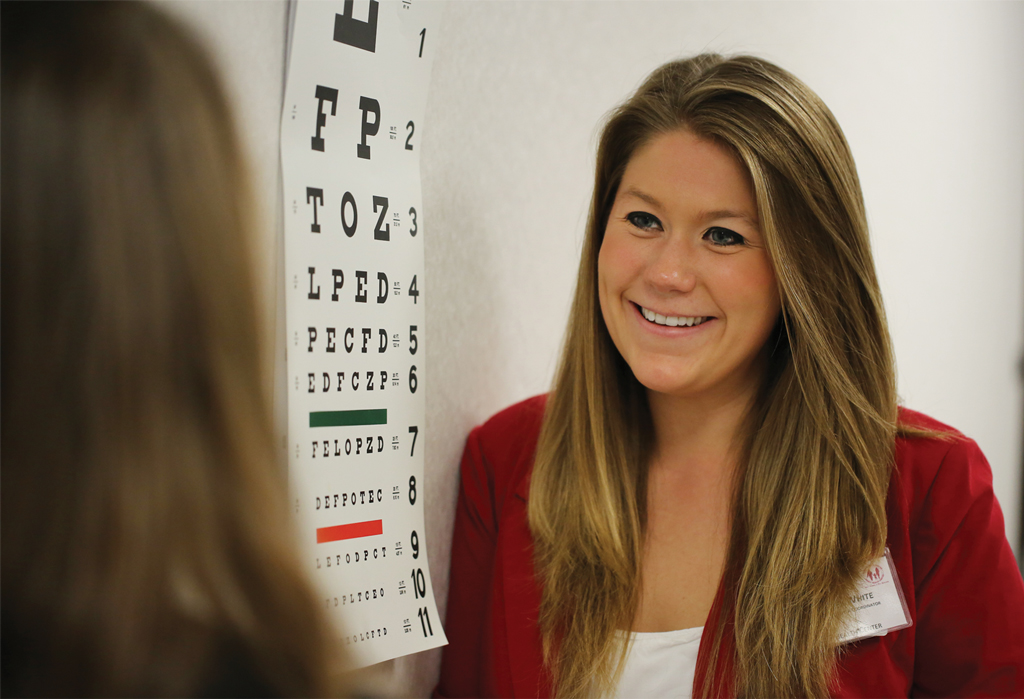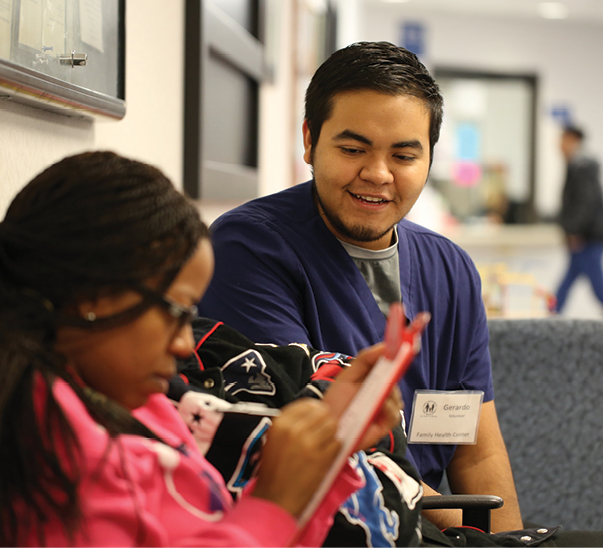Partners in Practice
Medical dramas such as Grey's Anatomy and ER have captivated audiences with stories of life as a doctor, nurse or paramedic, and while the characters and diagnoses are fictional on screen, they make viewers wonder what life as a healthcare professional is really like. Fortunately, Baylor undergraduate students studying to become healthcare professionals have incredible opportunities to step into the real world of healthcare thanks to Baylor's partners in practice.

Baylor intentionally has created and nurtured partnerships with various healthcare entities to make the undergraduate experience truly insightful, and these partnerships provide students a relevant glimpse into their futures as healthcare providers.
"We have enjoyed a productive working relationship with major healthcare providers for many decades, and we will continue to both deepen and broaden our collaborative efforts," says Lee Nordt, dean of the Baylor College of Arts and Sciences. “Many of our alumni, such as Joel Allison, BA '70, CEO, and Dr. Robert Pryor, BS '73, president, COO and CMO of Baylor Scott & White Health, are in positions of leadership in healthcare and make it a priority to provide support and learning opportunities for our students."
Prehealth students today are entering a very different environment than their predecessors of 10 to 15 years ago. Healthcare now is embracing the idea of teamwork and collaboration among various disciplines and specialties.
"By working closely with other Baylor academic units in this effort, we hope to enhance our ability to attract nationally recognized faculty, create centers of research excellence and help Baylor achieve its health science goals," says Nordt.
"In the healthcare profession historically, the model was to teach everyone to be viciously independent in the knowledge and science they learned," says Roland Goertz, MD, MBA '03, CEO of the Heart of Texas Community Health Center, Inc., one of Baylor’s partner locations and also known as the Family Health Center in Waco. "That's shifting to a stronger teamwork approach, basically with the acknowledgement that one can't know everything there is to know about the science of health anymore."
Goertz believes this is an exciting time to be entering the healthcare field, but navigating its complexities can be overwhelming. Baylor students who take advantage of the various partnerships in practice have a better understanding of what they can expect in their chosen professions as well as what will be expected of them. From highly competitive internships to much-desired shadowing opportunities, the forms in which these partnerships take shape vary but include summer research programs, volunteer/service projects, mentoring programs, internships and more.
These partnerships provide students the ability to explore and find their true callings in healthcare. Following is a sample of Baylor's partners in practice.
Partner: Baylor Scott & White Health
As one of the strongest, most widely recognized brands in healthcare, the Baylor name attracts undergraduate students to the campus with hopes of one day serving others in a health-related profession. In fact, 30 to 35 percent of incoming freshmen annually seek a healthcare profession as their ultimate educational goal, and one day many of them hope to be working with another "Baylor" - Baylor Scott & White Health.
"Obviously, the Baylor name is very, very important," says Joel Allison. "It's a brand that is well known throughout the world. The three Baylors--the Baylor College of Medicine in Houston, Baylor University in Waco and Baylor Scott & White Health (formerly Baylor Healthcare System)--have a long history of being instrumental in healthcare. Since there is a lot of interest in healthcare by students who attend Baylor, it is very important that the Baylor brand stands for not only quality education but quality healthcare, too."
Allison, who also serves as a Baylor regent, oversees the organization's two divisions-the North Division, featuring Baylor University Medical Center in Dallas, and the Central Division, featuring Scott & White Memorial Hospital in Temple--Baylor Scott & White Health serves most of North and Central Texas with a total of 46 hospitals and more than 500 access points. As a partner in practice with Baylor undergraduate students, Baylor Scott & White Health has numerous programs and opportunities in which to take advantage.
One of the most exciting programs is the Chief Medical Officer (CMO) Internship, which is led by Irving Prengler, MD, CMO, of Baylor Scott & White Health North Division in Dallas. This eight-week summer internship gives pre-health students the chance to work side by side with senior executive leaders of Baylor Scott & White Health. Each intern is paired with a member of the CMO Operations Council, a group of senior healthcare system physicians and administrators.
This internship is highly competitive, with an application process coordinated by the University’s director of pre-health studies and a Baylor Scott & White Health internship coordinator.
CMO interns gain a better understanding of healthcare system administrative leadership and executive decision making through direct observation at strategic and operational healthcare system meetings.
One of those interns is Hollie Burrus, BS '14, of Canton, Texas. The December 2014 graduate finished her coursework at Baylor in 3.5 years while majoring in biochemistry and minoring in medical humanities.
Burrus had planned to focus on direct patient care, but she applied for the CMO internship with hopes of learning more about the business of healthcare. She interned with Thomas Ledbetter, CMO and vice president of medical affairs at Baylor Scott & White Medical Center-Waxahachie and secretary of the Baylor Quality Alliance Board of Managers.
"I had no idea the experience would change my thoughts on my future," she says. "During the internship, I saw the importance of each and every physician and their role in providing quality care for patients. After working with Dr. Ledbetter and seeing how instrumental he was in running the medical facilities in Waxahachie, I became excited at the thought of being in a similar position someday. I can now see myself doing both, seeing patients and holding an administrative role.
"When Dr. Ledbetter was with patients, he listened to them, guided them, and prayed with them. Never did he hesitate to mention his faith or the power of God in healing. As a mentor, he gave constructive criticism and helped me to develop a research project that has opened the eyes of many physicians, helping them understand the importance of fully engaging with diabetes patients. I am so grateful for the CMO internship experience and my time with Dr. Ledbetter," says Burrus, who will begin medical school at Texas A&M Health Science Center in fall 2015.
In Waco, Baylor Scott & White Hillcrest Medical Center offers Baylor students numerous ongoing opportunities for summer programs, internships, mentoring and research. Graduate students in the Robbins MBA Healthcare Program may complete their required seven-month residency at Hillcrest. Undergraduate options include pre-med students shadowing medical and surgical physicians and pre-physician assistant students shadowing in the primary care and specialty clinics. Pre-med students are offered training to scribe for emergency room physicians to help students expand their medical vocabulary and to become immersed in a level II trauma center. Students also work as concierges in the hospital lobby, ER, surgical floor and in the medical office building. Plus, more than 40 students volunteer in the hospital’s cancer center, gift shop and rehabilitation center.
Austin senior Gretta Smith, a pre-med biology major, took part in the Hillcrest Clinical Research Program for three months during summer 2014. During her internship, she worked in the ER with her mentors, collected data, shadowed doctors and nurses, and performed a research study and presentation for the department at the end of the summer on the efficiency of EKG procedures in the ER department.
"We worked closely with the administrative heads and physician staff of the department as well as the cardiology department, all of whom guided us throughout the process of getting to know the ER and how to go about data collection," she says. "The internship gave me the chance to interact directly with many different aspects of the emergency room, from doctors to nurses to administrative directors. I think it was unique in that we not only got to gain experience in research skills and conducting a study, but we also spent many hours in the ER actually getting a chance to explore our passion with mentors who provided us with any learning opportunity we could ask for."
From honing her research skills to giving her clinical experiences, Smith says that her Hillcrest internship was extremely impactful.
"The time that I spent at Hillcrest made me more confident of my future in healthcare. As a whole, it increased my confidence in the fast pace of the emergency room, and it equipped me with skills that improved my ability to think critically about how medicine is an ever-evolving field and about how I can contribute to that change."
Additionally, graduate students in biomedical studies work with researchers at the Baylor Research Institute in Dallas in the fields of transplantation, metabolic disease, gastroenterology and immunology.
One of the oldest partnerships in practice is the one that began 104 years ago with the University’s nursing school. Today, the Louise Herrington School of Nursing is located on the campus of Baylor University Medical Center in Dallas. Initially, the nursing school was a diploma program affiliated with the hospital, which then was owned by Baylor University. In 1950, the nursing school began to grant bachelor’s degrees in nursing as part of Baylor academic divisions, but the partnership continued.
This important relationship allows Baylor nursing students to enjoy priority placement for clinical experiences in its facilities.
In addition, two staff members have joint appointments in the nursing school and Baylor Scott & White Health. Susan Houston, PhD, is the director of nursing research at Baylor Scott & White Health North Division and serves as the interim associate dean of research and scholarship for the school of nursing. Dora Bradley, PhD, is the vice president for nursing development for Baylor Scott & White Health North Division and serves as the associate dean of academic partnerships for the nursing school.
The Louise Herrington School of Nursing has additional partnerships with many medical facilities within the Dallas-Fort Worth area, including Parkland Hospital, Presbyterian Healthcare Center, the Methodist Health System, health departments and school systems.
Partner: Family Health Center
The Family Health Center opened in 1970 and became a federally qualified health center in 1999. A nonprofit organization, the center has 12 locations offering medical, dental and behavioral services to the underserved citizens of McLennan County. Most of these patients have little or no access to healthcare without the center. In addition, the center is home to a fully accredited family medicine residency program, a regional area health education center and a faculty development center.
While the center and Baylor have enjoyed a strong relationship through the years, its partnership has become more formalized in the last two, in large part due to the passion for primary care of Lauren Barron, MD, BA '88, clinical professor and associate director for Baylor's medical humanities department and a family practitioner. She is also a graduate of the center's residency program.
"I want to help create bridges between Baylor and the Family Health Center clinics because the center is an amazing place," Barron says. "When I have my doctor hat on, I know that we are doing all we can to see patients one at a time. For my pre-med students planning to attend medical school, the center is where they can watch great doctors care for an under-served population and give each patient one-on-one attention. They see the magic happen in front of them. At a time when more and more primary care doctors are needed and will continue to be needed, hopefully this early exposure to family medicine stays with these students before they become jaded, exhausted and overwhelmed. I think it makes a difference that it is happening before their formal training."
To make this relationship a true partnership where all parties-the center's staff, its patients and Baylor students-benefit, Barron began compiling a list of activities that a student could complete on a volunteer basis that would provide a true service for the clinics. Items on the list range from making copies, assembling patient packets, and cleaning out sample closets to filing, faxing and cleaning the staff kitchen and refrigerator. She looked for practical, tangible and meaningful jobs that would teach students what it takes to run a medical office while freeing staff time for other activities.
With this volunteer and service attitude at center stage, Barron knew what would happen: every student's dream--shadowing a doctor--would occur naturally.
"When they show up on time, do their jobs, are poised, polished and helpful, the shadowing part just occurs organically, and to me that serves everyone and is a win/win for everyone," she says. "I preach about the main role of the Baylor student when it comes to the volunteer duties at the center, and in my mind, the main role is service. The shadowing will happen, but I think it is only fair for the student to earn that privilege through service."
"In fact, at the heart of any health-related field is service. To me that is obvious, but it is not that obvious all the time. A lot of people think that medicine and healthcare is science. It turns out that reminding people that the fundamental core of medicine is service is a fairly radical act."
Currently, Barron is working with pre-health organizations on campus which historically have needed service projects annually to fulfill membership goals. She plans to pair a student organization with each Family Health Center clinic, building on the volunteer/service model she has implemented successfully at two of the clinics near the campus, the South 18th Street Community Clinic and the Martin Luther King Jr. Clinic.
Recent Baylor graduate, Laura White, BS '14, could not have imagined how her life would change when she became a volunteer at the South 18th Clinic in her junior year through the pre-health honors organization, Alpha Epsilon Delta. She now works full time at the Family Health Center as a liaison between Baylor students and the center’s clinics. Funded by AmeriCorps, White’s job is to create an infrastructure for the clinics and the various organizations at Baylor interested in participating in Barron’s volunteer/service model.
"I fell in love with the clinic system when I first volunteered," White says. "It became the highlight of my week. To see the physicians serve patients that truly needed their assistance and to see them serve them so well, it was pretty motivating. Once I was exposed to it, it was hard for me not to get more and more involved.
"What I have been so fortunate to find at the Family Health Center is an example from every doctor of the kind of person I want to be, the people I want to serve and the way I want to make an impact," White says. "Ideally, I would love to attend medical school in Texas and pursue a career in family medicine." This is certainly music to Barron's ears.
A first-generation college student, senior biology major Gerardo Martinez decided to pursue a medical profession because of his desire to alleviate anxiety and provide comfort to people, regardless of socioeconomic background. "Growing up, access to medical care was always very difficult," says Martinez of Fort Worth. "Medicine was considered to be a costly trip to a doctor. Instead of going to the physician, my family would self-diagnose or let the illness take its course rather than face the possibility of not having enough money for necessities. Yet, medicine is a necessity and it was this disparity in the accessibility of healthcare that drew me to pursue the medical field. The idea of healthcare shouldn't produce anxiety, it should provide comfort."
Thanks to Baylor's partnership with the Family Health Center clinics in Waco, Martinez has begun to learn how to help patients by shadowing and volunteering as part of Alpha Epsilon Delta.
Martinez and his fellow students take two-hour shifts during the week. Typically, the first hour involves assisting the staff nurses and receptionists and performing any projects assigned by AmeriCorps, such as patient satisfaction surveys, patient reminder calls, a drive to provide free books for patients or improving the children’s play areas in the clinics. The second hour involves more volunteering or shadowing physicians who are meeting with patients.
"Shadowing doctors has given me a realistic view of the population I would one day like to serve," says Martinez. "I have acted as a translator between the physicians and patients, witnessing the challenges that Spanish-speaking patients have in communicating with physicians … and I have witnessed the selfless efforts of doctors performing acts of kindness toward their patients.
"Baylor has provided me with an opportunity to explore these two sides of medicine: science and humanities. I feel as though I can approach the field of medicine not only as a scientist but also as a compassionate human being."
Martinez will attend the University of Texas Southwestern Medical Center and plans on specializing in family medicine. One day, he hopes to return to Waco's Family Health Center as a physician.
Partnerships such as the one between the Family Health Center and Baylor impact students in many ways, says Goertz of the Family Health Center. First, the student sees teamwork and collaboration with the academic entity and the community, much like White's experience.
"I firmly believe that academic entities of all kinds are part of the community. They serve and do not have glass walls around them," Goertz says. “It does not bode well for the ultimate success of the community or school if there are walls between them. Programs like these show how the community and the school work together, and that’s worth a lot in the world of tomorrow."
Secondly, the school gets the benefit of an expanded classroom. "It magnifies and extends the classroom in the real world and I think that is an incredibly valuable process. I also live by the adage that very few people become anything or pursue a career that they are unfamiliar with. I don’t want to lose a really good healthcare provider or caregiver simply because they haven’t had the opportunity to see what it is like."
Partner: Baylor College of Medicine
Baylor College of Medicine in Houston also offers undergraduates unique opportunities to further their knowledge and experience in healthcare. With research funding of nearly $400 million, Baylor College of Medicine is the only private health science university in the greater southwest.
"Baylor College of Medicine was privileged to be part of Baylor University as the Baylor University College of Medicine from 1903 until 1969 when the medical school became an independent institution," explains Paul Klotman, MD, president, CEO and executive dean of the College. "For the last 75 years, we have enjoyed a mutually beneficial relationship that includes having Baylor University representation on the Baylor College of Medicine Board of Trustees.
"The two institutions also have collaborative educational programs. The Baylor University/Baylor College of Medicine Baccalaureate/MD Program (Baylor2 Medical Track) allows six outstanding high school students to gain provisional acceptance to Baylor College of Medicine upon matriculation to Baylor University. Programs such as the Summer Medical and Research Training (SMART) program and the Tropical Medicine Summer Institute also offer unique opportunities for undergraduate students to pursue their interests in the field of healthcare. We continue to develop additional joint programs in education and research.
One of the six students selected each year for the Baylor2 Medical Track program receives a scholarship valued at $80,000 covering $10,000 per year for four years of undergraduate study at Baylor University and four additional years of medical study at Baylor College of Medicine.
The SMART program was developed by Baylor College of Medicine to provide biomedical summer research projects specifically for undergraduate students. The program offers nine paid weeks of biomedical-related research, daily seminars, free GRE prep workshops, career development events and housing in the dormitories at nearby Rice University. This program has gained nationwide recognition and is open to all science and math majors and even non-science majors with appropriate background and interest.
The newest program offered by Baylor College of Medicine is the Tropical Medicine Summer Institute, which began in 2013 with 10 Baylor students. Attendance doubled this summer with 20 students from Baylor and five from another university. A two-week program, the Institute seeks to introduce students to the field of tropical medicine with daily lectures on topics covering global health, epidemiology, public health, biotechnology, infectious diseases, parasitic diseases and neglected tropical diseases.
"The College of Arts and Sciences recently welcomed program architect and founding dean of the National School of Tropical Medicine at Baylor College of Medicine, Peter J. Hotez, MD, PhD, and associate dean Maria Elena Bottazzi, MD, PhD, into joint faculty appointments in our biology department," says Nordt. "We are proud to have Dr. Hotez and Dr. Bottazzi working alongside our students and faculty to give them the chance to take on a much larger role in the worldwide fight against tropical diseases."
Participants gain hands-on laboratory experience, visit research and public health centers and receive career advisement.
"One of the things that was so exciting about Baylor University was seeing its commitment to Christian mission in disease-endemic countries," says Hotez. "We have Baylor undergraduates going all over the world, and they're just captivated and fascinated by the culture and health issues affecting these countries."
Shreya Goyal, a senior Baylor Business Fellow from Plano, took part in the program in June 2014. She says listening to lectures from BCM professors and examining blood and parasites in the lab made a huge impact on her.
"Dr. Hotez explained the significance of tropical medicine research, which is so critical in today's society," says Goyal. "These diseases come with large human and economic costs, which are especially detrimental to developing countries. As a developed nation, we have a responsibility to help countries with broken healthcare systems and less access to proper medications to combat infection."
At the end of the two weeks, Goyal’s group made a presentation to BCM faculty, discussing the cultural implications of women’s health in India and providing recommendations.
"Our findings intrigued me. This research showed me that a country's culture can really impact how healthy its citizens are, particularly females," Goyal says. "In countries with high income inequality, such as India, women are at higher risks for acquiring certain diseases such as HIV. This really hit home with me, since most of my family still lives in India. This experience certainly inspired me to help females gain better access to quality healthcare."
Goyal plans to attended Baylor College of Medicine to become a physician or to pursue a future in healthcare administration.
Robbins College of Health and Human Sciences
In October, Baylor University's Board of Regents announced a significant gift from William K. and Mary Jo Robbins of Houston that named the University’s newest academic unit focused on health-related education and research--the Robbins College of Health and Human Sciences at Baylor University.
Baylor Regents established the College of Health and Human Sciences last May, uniting four existing health-related academic units:
The new college provides a forward-looking organizational structure that draws upon Baylor's Christian mission and tradition in healthcare to prepare scholars and leaders who can translate theory into practice and advance knowledge of health, human behavior and quality of life. The College's faculty and staff have begun to create curricula that will promote a team-based approach to patient care, and establish interdisciplinary research collaborations to advance solutions for improving the quality of life and to promote human flourishing.
A Baylor graduate and member of the Board of Regents, Bill Robbins received his bachelor of arts degree in 1952 and bachelor of law in 1954. He earned a juris doctor from Baylor Law School in 1969. He is founder and CEO of Houston-based North American Corp., which is engaged in consulting, finance, investments and oil and gas activities.
Mary Jo Robbins earned her bachelor of science degree in nursing from the University of Texas in 1975. During her 27 years in the nursing profession, she opened and managed 10 dialysis facilities in Texas.
With a deep sense of commitment to Christian missions, education and healthcare, the Robbins have supported important causes throughout the world, both personally and through The Robbins Foundation. At Baylor, their leadership gift in 2011 established the Robbins Institute for Health Policy and Leadership in the Hankamer School of Business. A gift to the MBA Healthcare Program in 2010 has helped to position Baylor and its students as internationally recognized leaders in the fields of health policy, research and education. In 2006, the Robbins provided the gift that supported construction of Robbins Chapel in Brooks Village.
"On behalf of the Baylor University College of Health and Human Sciences, we are so grateful for the generous gift given by Bill and Mary Jo Robbins to name the Robbins College of Health and Human Sciences. We are truly humbled by their visionary support that serves to strengthen academic excellence in health-related education and research here at Baylor," said Shelley F. Conroy, EdD, the inaugural dean of the Robbins College of Health and Human Sciences. "Together we share a common purpose of improving the quality of life of individuals, families and the global community. We are blessed by sustaining contributions that support Baylor’s vision of Pro Futuris that reminds us that our past is inextricably linked to our future, and our obligation, to God and to the world, continues."
- communication sciences and disorders;
- family and consumer sciences;
- health, human performance and recreation; and the
- Louise Herrington School of Nursing



